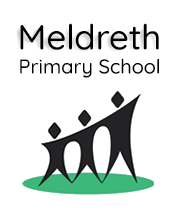The staff at Meldreth Primary are very clear that the assessment tools that we use need to show children's next steps and allow progress to be tracked across the school and not just at the end of a Key Stage.
The principles that underpin our assessment system are:
- Every child can achieve: teachers at Meldreth have the mindset, ‘What do I need to do next to enable a child in my class to achieve?’
- The National Curriculum objectives will be used as the expectations for all children.
- Children will make age appropriate progress – 12 months in 12 months.
- Teachers are experts at assessment - assessment will be effectively used to ensure the correct scaffolding is built into lessons to ensure all children achieve.
In order to be ‘secondary ready’ children need to meet the required end of Key Stage 2 expectations; this is broken down into key outcomes for each curriculum year. We use the National Curriculum objectives to assess outcomes for children at the end of each curriculum year – for example:
- A child that has achieved all the objectives set out for Year 3 for English would be said to be working at the end of Year 3 expectation for English.
- A child achieving half or so of the mathematics objectives for Year 5 would be classed as working within the mid-Year 5 expectation for maths.
- A child achieving only a few reading objectives for Year 1 would be classed as working at the beginning of Year 1 expectations.
Our assessment and reporting system includes:
- Ongoing questioning, observation and dialogue by the class teacher throughout each lesson.
- Children knowing what they are being asked to learn and more importantly, why.
- Sharing 'success stars' with the children during each lesson, work is then assessed against this criteria.
- Feedback from each pupil, their peers or teachers have clearly identified next steps – this can be written or verbal feedback.
- Regular scrutiny of pupils’ work.
All of the above will feed into 'Data snap-shots', these will take place at class and subject level three times a year, towards the end of each term.
Assessment for learning is at the centre of teaching and learning at Meldreth Primary. Teachers will assess your child’s attainment and progress in a range of ways.
FFT Aspire Pupil Tracking
From January 2021, teachers at Meldreth Primary will make use of the FFT Aspire Pupil Tracking system to record all assessment outcomes including Teacher Assessments and Standardised Tests.
Teachers’ summative assessment
Taking account of all the evidence accumulated over a term, including the results of standardised tests or any other tests or other assessment activities, teachers arrive at a summative assessment of pupil achievement in reading, writing and mathematics. They evaluate current attainment by considering how well children have learned what has been taught.
Standardised Tests
Standardised Tests (NFER) are shared with children three times for children in years 1-6. The results of these tests inform:
- an evaluation of the progress pupils make throughout the year and year-on-year;
- moderation and benchmarking of standards and expectations across year groups within and between Trust academies;
- triangulation of the evidence available to inform teachers’ summative assessment judgements.
Formative Assessment
Formative assessment of whole class and cohort gaps in learning and misconceptions to inform teachers’ planning for future teaching and learning and school leaders’ planning for professional learning and school improvement.
Age standardised scores as well as on-going teacher assessments are recorded in FFT Aspire Pupil Tracking.
Your child’s attainment and process within Reading, Writing and Maths will be shared with you within parent consultation meetings each term. You will receive a written report if your child’s attainment at the end of the Summer Term.
Statutory National Assessments
Within all schools in England children will undertake the following Assessments:
-
At the beginning of the year a new national ‘baseline’ assessment shows everything children can do when starting school so that teachers know what they need to learn next. This will be shared at the first Puffin class parents’ evening.
From then on, children in Puffin class are assessed against the Prime and Specific areas of Learning in the EYFS profile.
Assessments will be based on observation of daily activities and events. At the end of their first year in school teachers will judge whether a child is meeting the level of development expected at the end of the Foundation Stage for each Early Learning Goal and this will be reported to parents/carers as:
- Emerging, not yet reached the expected level of development
- Expected
- Exceeding, beyond the expected level of development for their age
- Year 1 children undertake a phonic screening check in June. These results are shared within your child’s annual report
- Results from these assessments are shared at the end of the summer term with your child’s annual report.
- Children in Year 4 undertake a multiplication check in June which assesses recall of multiplication facts.
- SATs (Standard Assessment Tests) are taken by children in Year 6 during May. They assess within Reading, Writing, Maths and spelling, punctuation and grammar.
